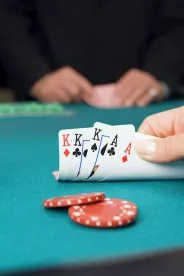Late last year, Sport Shorts brought you a case note involving Phil Ivey, “the world’s best poker player”, advantage play and the disputed recovery of £7.7 million of winnings from Crockfords Club casino in London (“Crockfords”). Following our review of the background, first instance and Court of Appeal rulings, the Supreme Court has now settled the matter.
Supreme Court
Last week, the Supreme Court also unanimously dismissed Mr Ivey’s appeal. You can read Lord Hughes’ judgment here.
The court summarised Mr Ivey’s submissions as follows [37]
“(a) the test of what is cheating must be the same for the implied term [that neither of the parties to the gambling contract would cheat] as for section 42 [of the Act]
(b) cheating necessarily involves dishonesty;
(c) the judge found that Mr Ivey was truthful when he said that he did not consider what he did to be cheating; therefore dishonesty and in particular the second leg of the test established in R v Ghosh [1982] QB 1053 had not been demonstrated;
(d) it follow[ed] that what was done was not cheating, and Mr Ivey ought to have recovered the £7.7 million.”
Taking the issues in turn:
Cheating
Whilst stating that “it would be very unwise to attempt a definition of cheating” [47], Lord Hughes agreed with Arden LJ in the appellate court that the meaning of cheat in the context of the implied term should follow section 42 of the Act.
Lord Hughes held that it is “perfectly clear that in ordinary language cheating need not involve deception, and section 42(3) recognises this. Section 42(3) does not exhaustively define cheating, but it puts beyond doubt that both deception and interference with the game may amount to it” [45].
For Mr Ivey, it was therefore his conduct that lead to a finding of cheating:
“It may be that it would not be cheating if a player spotted that some cards had a detectably different back from others, and took advantage of that observation, but Mr Ivey did much more than observe; he took positive steps to fix the deck. That, in a game which depends on random delivery of unknown cards, is inevitably cheating” [50].
Interestingly, even if the court had agreed with Mr Ivey that cheating necessarily involved a legal element of dishonesty, Lord Hughes found that Mr Ivey’s deception of the croupier would have satisfied such a requirement.
Dishonesty
The court then used the appeal as an opportunity to examine the law of dishonesty more broadly. Since the decision in R v Ghosh [1982] QB 1053, in criminal cases, judges have been required to direct the jury to apply the following two stage test:
“Firstly, it must ask whether in its judgment the conduct complained of was dishonest by the lay objective standards of ordinary reasonable and honest people. If the answer is no, that disposes of the case in favour of the defendant.
But if the answer is yes, it must ask, secondly, whether the defendant must have realised that ordinary honest people would so regard his behaviour, and he is to be convicted only if the answer to that second question is yes” [54].
However, since its formulation, the test has often been criticised. As the court noted, “the principal objection to the second leg of the Ghosh test is that the less the defendant’s standards conform to what society in general expects, the less likely he is to be held criminally responsible for his behaviour” [58].
In light of this paradox, and following a detailed examination of the case law, legislation and historic context, the court found that “the second leg of the test propounded in Ghosh does not correctly represent the law and directions based upon it ought no longer to be given” [74].
Instead, the test of dishonesty is now as set out by Lord Nicholls in Royal Brunei Airlines Sdn Bhd v Tan [1995] 2 AC 378 and Lord Hoffman in Barlow Clowes International Ltd v Eurotrust International Ltd [2005] UKPC 37; [2006] 1 WLR 1476.
As Lord Hughes states, “when dishonesty is in question the fact-finding tribunal must first ascertain (subjectively) the actual state of the individual’s knowledge or belief as to the facts. The reasonableness or otherwise of his belief is a matter of evidence (often in practice determinative) going to whether he held the belief, but it is not an additional requirement that his belief must be reasonable; the question is whether it is genuinely held. When once his actual state of mind as to knowledge or belief as to facts is established, the question whether his conduct was honest or dishonest is to be determined by the fact-finder by applying the (objective) standards of ordinary decent people. There is no requirement that the defendant must appreciate that what he has done is, by those standards, dishonest” [74].
Applying this formulation of dishonesty, Mr Ivey’s conduct was found both to be cheating and (whilst truthful) dishonest.
Comment
Whilst the judgment is of obvious importance to Mr Ivey, Crockfords and the gambling industry as a whole, the findings of the Supreme Court as to dishonesty will have a wide-ranging effect across criminal law.
Indeed, Stephen Parkinson of Kingsley Napley, the firm that represented Crockfords, has described the case as “one of the most significant decisions in criminal law in a generation. The concept of dishonesty is central to a whole range of offences, including fraud.”
As for whether this jurisprudential significance will console Mr Ivey in the absence of his £7.7 million, I will leave that question to our Sports Shorts readers.
Ethan Douglas contributed to this article.



 />i
/>i
